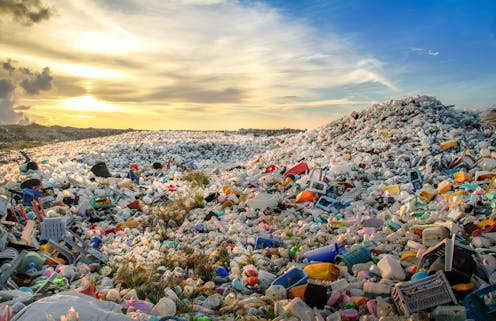While plastic dominates human consumption, the global economy will remain hooked on fossil fuels
- Written by Adam Hanieh, Professor of Political Economy and Global Development, Institute of Arab and Islamic Studies, University of Exeter

In early December 2024, hopes for a landmark global treaty to curb plastic pollution were dashed as negotiations in South Korea stalled[1]. Leading the campaign against the deal were major oil-producing nations, especially Saudi Arabia and Russia, who argued[2] for a more flexible approach to any legally binding limits on plastic manufacturing.
The collapse of any agreement came despite scientific research delivering ever more alarming warnings[3] about the dangers of plastic pollution. Over the last two years, an avalanche of studies have revealed the pervasive presence of tiny plastic particles in human blood[4], brains[5], and even placental tissue[6].
These particles, which stem from the breakdown of larger plastic waste, have been linked to everything from inflammation[7] to hormonal disruption[8], and potential long-term health risks such as cancer[9]. Aside from their effects on human health, plastics are wreaking havoc on marine ecosystems[10], with microplastics now found in Arctic ice and in the bodies of fish and birds.
Behind these alarming studies stands a seemingly unstoppable juggernaut of plastic production. The annual global production of plastics reportedly grew nearly two hundredfold[11] between 1950 (two million tonnes) and 2015 (381 million tonnes), and the pace of growth is accelerating[12].
Over half of all plastics ever made were produced in the past 25 years[13], and production levels are estimated to double or triple again[14] by 2050. And more production brings more waste.
Less than 10%[15] of all plastics ever produced have been recycled. And the volume of “mismanaged plastics” – those which are not recycled, incinerated, or sealed in landfills – is also estimated[16] to double by 2050.
It seems as if humans have become the organic detritus within a plastic world of our own creation.
Plastic elephants
But despite growing awareness around the problems associated with plastic, there is a fundamental flaw in how we tend to think about it as a product.
For there is a tendency to frame plastic as a problem of pollution and recycling[17], rather than as an integral part of our fossil fuel-driven world. This narrative is also promoted by major oil companies, such as the American giant, ExxonMobil, which stated[18] in the lead up to the South Korean summit: “The issue is pollution. The issue is not plastic.”
The problem with this perspective is that it obscures the fact that plastics are petrochemical products: substances which are ultimately derived from oil and gas.
Indeed, the future of fossil fuels is increasingly tied to the future of plastics. It has been estimated that by 2040, plastics will account for as much as 95% of net growth[19] in oil demand.
This is perhaps why 220 fossil fuel lobbyists attended those recent treaty discussions, outnumbering all other delegations. It could also explain why Saudi Arabia, home to one of the world’s largest petrochemical companies[20], led the opposition to any global limits on plastic production.
At the core of capitalism
The problem we confront is not simply the presence of an oil lobby, it is the systemic role that plastics play within capitalism.
Plastics, and the wider petrochemical industry, played a crucial part in the transformation of global capitalism from the mid-20th century onwards.
As I explore in my book, Crude Capitalism[21], the things we used to need to build and make things previously relied on sourcing naturally occurring, labour-intensive goods like timber, cotton or metals. But the invention of plastics and other synthetic materials separated commodity production from nature.
Oil became more than a fuel – it was the substance that came to dominate our lives. A petrochemical shift to the rise of an oil-dominated world. With capitalism untethered from natural cycles, there was a radical reduction in the time taken to produce commodities and an end to any limits on the quantity and diversity of goods produced.
Along with this, consumption habits became centred around notions of disposability and obsolescence. Plastics made the essential features of contemporary capitalism possible: a drive to limitless growth, continual acceleration of production and consumption, and the frenzied expansion of markets.
The emergence of fast fashion is just one example. Alongside poorly paid garment workers in countries such as Bangladesh, really cheap clothing was only made possible through the massive expansion of polyester production (a kind of plastic), which freed the industry from its dependence on supplies of wool and cotton.
The consumption of plastics looms large in today’s ecological crisis. And having become so accustomed to thinking about oil and gas as primarily an issue of energy and fuel choice, perhaps we have lost sight of how much of our lives depend upon the products of petroleum.
These synthetic materials drove a post-war revolution in productivity, bringing labour-saving technology and mass consumption. It is now almost impossible to identify an area of life that has not been radically transformed by the presence of plastics and other petrochemicals.
Plastic products have become normalised as natural parts of our daily existence. And it is this paradox which must be fully confronted if we are to move beyond fossil fuels.
References
- ^ stalled (theconversation.com)
- ^ who argued (apnews.com)
- ^ alarming warnings (www.nature.com)
- ^ human blood (www.sciencedirect.com)
- ^ brains (jamanetwork.com)
- ^ placental tissue (academic.oup.com)
- ^ inflammation (pubs.acs.org)
- ^ hormonal disruption (pmc.ncbi.nlm.nih.gov)
- ^ cancer (www.sciencedirect.com)
- ^ marine ecosystems (www.sciencedirect.com)
- ^ two hundredfold (datasource.kapsarc.org)
- ^ accelerating (www.statista.com)
- ^ 25 years (www.eea.europa.eu)
- ^ again (www.neste.com)
- ^ Less than 10% (www.technologyreview.com)
- ^ estimated (pub.norden.org)
- ^ pollution and recycling (www.theguardian.com)
- ^ stated (www.ft.com)
- ^ 95% of net growth (www.vox.com)
- ^ petrochemical companies (www.weforum.org)
- ^ Crude Capitalism (www.versobooks.com)
- ^ Kodda/Shutterstock (www.shutterstock.com)







